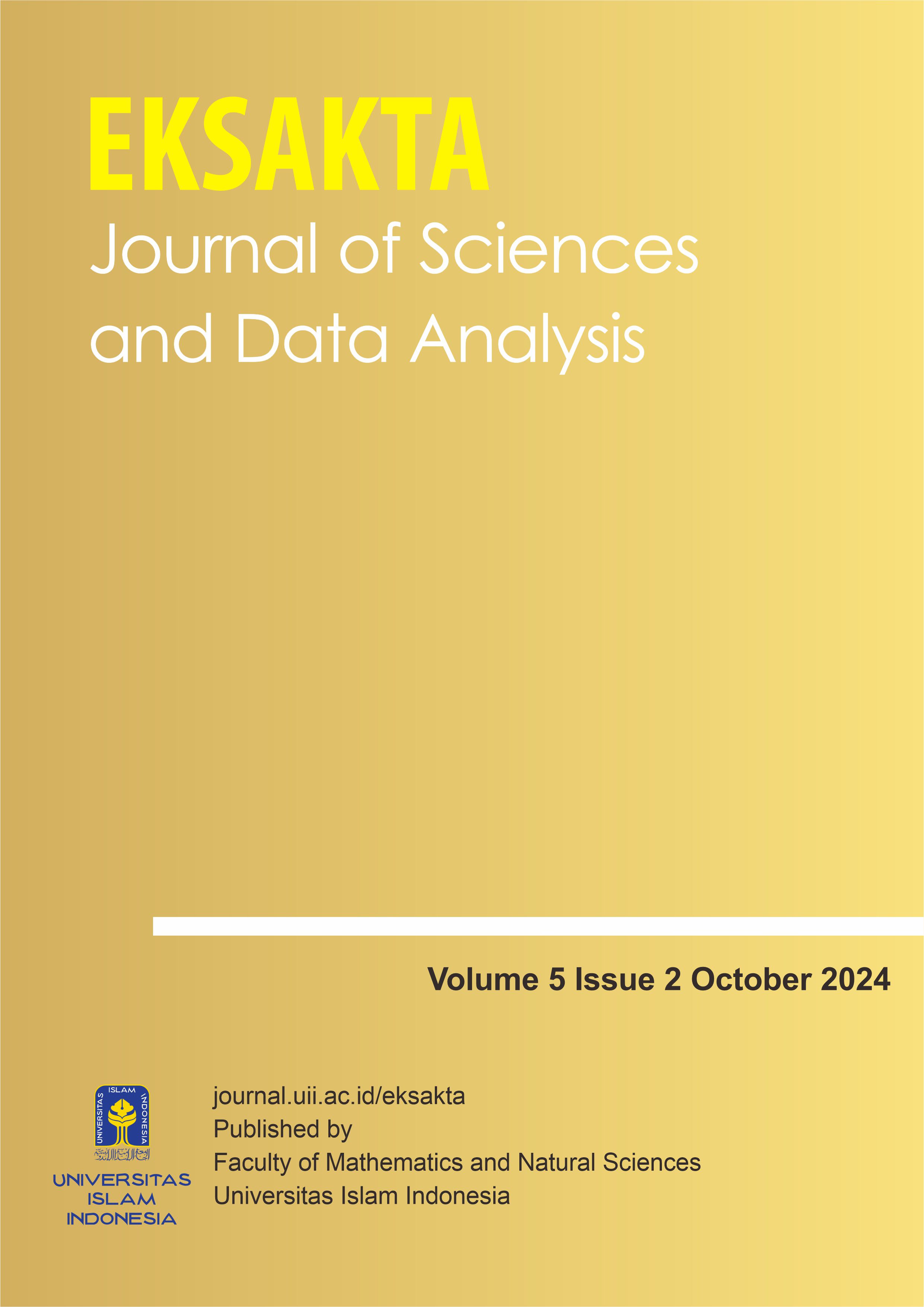Main Article Content
Abstract
This study aims to investigate the microencapsulation of C. caudatus K. leaves extract under optimal conditions, focusing on its potential as a therapeutic option for type 2 diabetes. In order to determine the inhibitory effect on the α-amylase enzyme, which plays a crucial role in glucose metabolism, biological activity assays were performed. The procedure of effectively encapsulating the substance was achieved at a pH level of 6 using sodium alginate at a concentration of 2% (w/v), resulting in a 77.2% percentage of encapsulation. The experiment involving the inhibition of α-amylase exhibited an IC50 value of 69.44 ± 0.924 μg/mL, demonstrating the significant biological activity of the microcapsules. The bioactive substances encapsulated in the microcapsules were released during intervals 30-120 min, at pH conditions of 2.2 and 7.4. The release of bioactive substances was only 2.32 % after 120 minutes at a pH of 2.2, whereas it increased to 64.54 % at a pH of 7.4. This discovery indicates that the microcapsules contain the capability to be utilized for the regulated delivery of drugs. The findings of this research demonstrate the potential to develop herbal medicines with therapeutic properties through microencapsulation, providing an excellent opportunity for managing type 2 diabetes.
Keywords
Article Details
Copyright (c) 2024 Safina Samara Nur Fadlila, Oktavia Eka Puspita, Zubaidah Ningsih, Anna Safitri

This work is licensed under a Creative Commons Attribution-ShareAlike 4.0 International License.
Authors who publish with this journal agree to the following terms:
- Authors retain copyright and grant the journal right of first publication with the work simultaneously licensed under a Creative Commons Attribution License that allows others to share the work with an acknowledgment of the work's authorship and initial publication in this journal.
- Authors are able to enter into separate, additional contractual arrangements for the non-exclusive distribution of the journal's published version of the work (e.g., post it to an institutional repository or publish it in a book), with an acknowledgment of its initial publication in this journal.
- Authors are permitted and encouraged to post their work online (e.g., in institutional repositories or on their website) prior to and during the submission process, as it can lead to productive exchanges, as well as earlier and greater citation of published work (See The Effect of Open Access).
References
- This study aims to investigate the microencapsulation of C. caudatus K. leaves extract under optimal conditions, focusing on its potential as a therapeutic option for type 2 diabetes. In order to determine the inhibitory effect on the α-amylase enzyme, which plays a crucial role in glucose metabolism, biological activity assays were performed. The procedure of effectively encapsulating the substance was achieved at a pH level of 6 using sodium alginate at a concentration of 2% (w/v), resulting in a 77.2% percentage of encapsulation. The experiment involving the inhibition of α-amylase exhibited an IC50 value of 69.44 ± 0.924 μg/mL, demonstrating the significant biological activity of the microcapsules. The bioactive substances encapsulated in the microcapsules were released during intervals 30-120 min, at pH conditions of 2.2 and 7.4. The release of bioactive substances was only 2.32 % after 120 minutes at a pH of 2.2, whereas it increased to 64.54 % at a pH of 7.4. This discovery indicates that the microcapsules contain the capability to be utilized for the regulated delivery of drugs. The findings of this research demonstrate the potential to develop herbal medicines with therapeutic properties through microencapsulation, providing an excellent opportunity for managing type 2 diabetes.
References
This study aims to investigate the microencapsulation of C. caudatus K. leaves extract under optimal conditions, focusing on its potential as a therapeutic option for type 2 diabetes. In order to determine the inhibitory effect on the α-amylase enzyme, which plays a crucial role in glucose metabolism, biological activity assays were performed. The procedure of effectively encapsulating the substance was achieved at a pH level of 6 using sodium alginate at a concentration of 2% (w/v), resulting in a 77.2% percentage of encapsulation. The experiment involving the inhibition of α-amylase exhibited an IC50 value of 69.44 ± 0.924 μg/mL, demonstrating the significant biological activity of the microcapsules. The bioactive substances encapsulated in the microcapsules were released during intervals 30-120 min, at pH conditions of 2.2 and 7.4. The release of bioactive substances was only 2.32 % after 120 minutes at a pH of 2.2, whereas it increased to 64.54 % at a pH of 7.4. This discovery indicates that the microcapsules contain the capability to be utilized for the regulated delivery of drugs. The findings of this research demonstrate the potential to develop herbal medicines with therapeutic properties through microencapsulation, providing an excellent opportunity for managing type 2 diabetes.




